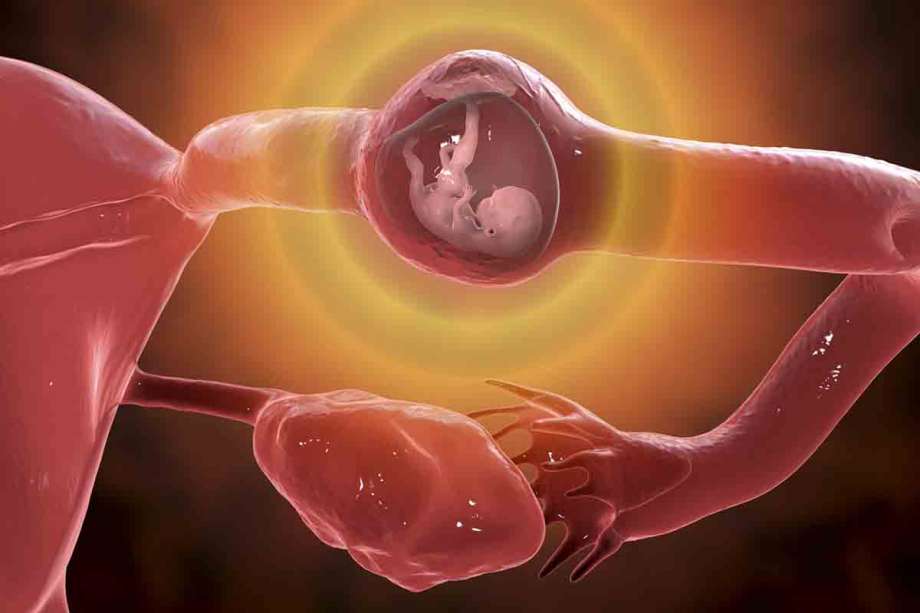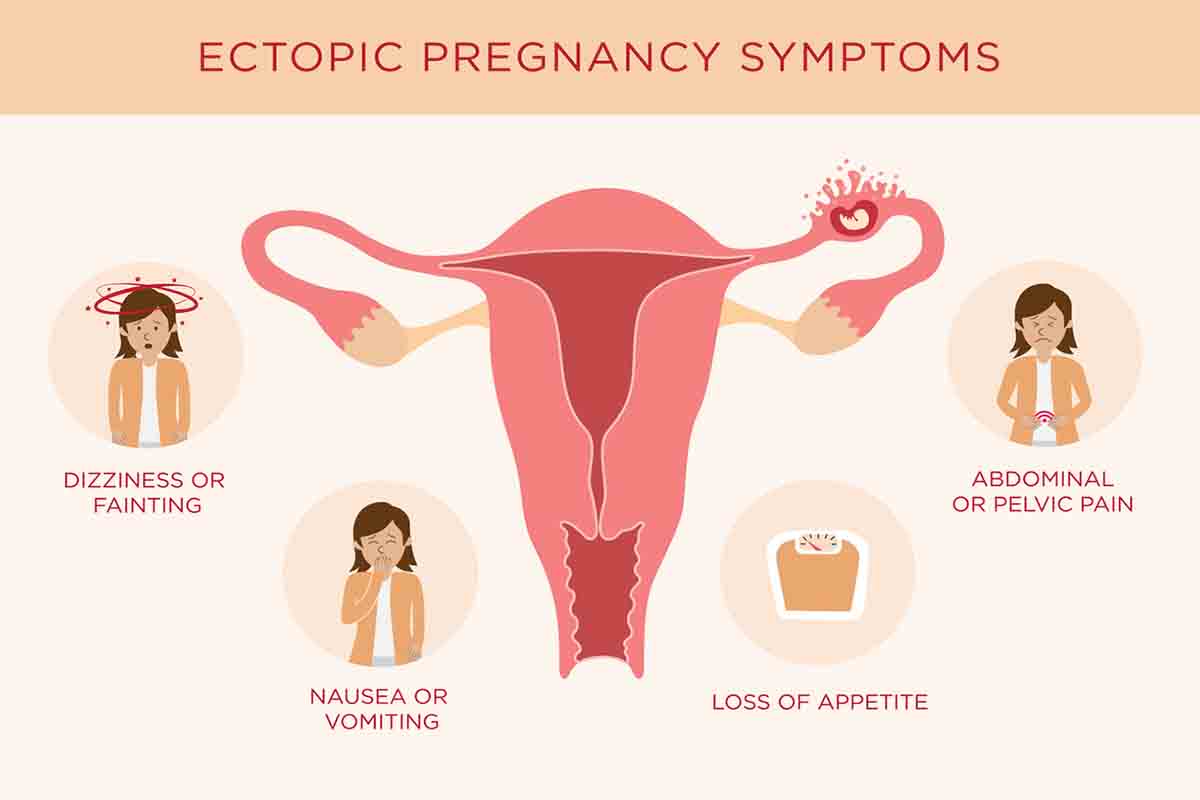What is an Ectopic Pregnancy?

In a healthy pregnancy, the fertilized egg implants inside of the uterine cavity. An ectopic pregnancy may also be called a tubal pregnancy, and it occurs when a fertilized egg implants outside of the uterine cavity.
A pregnancy that is implanted outside of the uterine cavity is not a normal pregnancy, and the baby cannot survive until full term. This means that an ectopic pregnancy will always result in a pregnancy loss, even if the baby has a heartbeat when the ectopic pregnancy is first discovered.
Related: Molar Pregnancy: Understanding Causes and Treatment Options
How common is an ectopic pregnancy?
Most ectopic pregnancies occur in the fallopian tube, which is the tube that allows an egg to make its way from the ovary to the uterus after ovulation and fertilization. Because the egg gets fertilized in the fallopian tube, sometimes the pregnancy can abnormally attach inside of the tube instead of reaching the uterus, where it is supposed to implant.
Ectopic pregnancies can also occur in other locations in the abdomen, such as on an ovary, in the cervix (opening of the uterus into the vagina), or in the abdominal cavity itself. The location of the ectopic pregnancy may change based on whether a pregnancy is conceived spontaneously or by assisted reproductive technology.
Most pregnancies implant in the correct location, but anywhere from 1-2% of all known pregnancies.
Causes of ectopic pregnancy
Any person who conceives can have an ectopic pregnancy. However, the risk of an ectopic pregnancy is increased in some populations. If a person has had a previous ectopic pregnancy, their odds of another ectopic pregnancy are greater.
Even if you have one of the risk factors listed above, keep in mind that most people with risk factors will not have an ectopic pregnancy. Around 98% of pregnancies implant correctly inside the uterine cavity.
Pelvic Scarring
One group of people who are at higher risk for ectopic pregnancy are people who have scarring in the pelvis.
This scarring can occur from a pelvic surgery, like a cesarean section or a dilation and curettage procedure inside the uterus.
Scarring can also occur from another condition, like a sexually transmitted infection (STI) such as chlamydia or pelvic inflammatory disease (PID), or a medical condition such as endometriosis.
Getting Pregnant While on Birth Control
Ectopic pregnancies are also more likely in people who conceive while using some types of birth control, like a progestin-releasing IUD or a tubal ligation.
Assisted Fertility Treatments
Ectopic pregnancy has been found to be more common in people who used some type of assisted reproductive technology such as fertility treatments like IVF to conceive.
Smoking Cigarettes
The dangers of smoking during pregnancy to the baby’s health and development are well known. However, many people are unaware that even smoking cigarettes before pregnancy can be dangerous. Ectopic pregnancy is also more common in smokers and people who have a partner who smokes cigarettes due to the effects of secondhand smoke.
What are the signs of an ectopic pregnancy?
Most people who have an ectopic pregnancy will notice pain and vaginal bleeding in early pregnancy, usually somewhere around 6-8 weeks gestation (2-4 weeks after a missed period).
The pain is usually felt on one side of the lower abdomen. The pain may start as mild and may come and go, but it will frequently become severe and persistent.
If an ectopic pregnancy is not recognized early and an embryo growing in the fallopian tube grows large enough, the tube can rupture. This would typically cause sudden severe pain that spreads across the lower abdomen.

Internal bleeding from a ruptured tube can also occur inside the abdomen, which can irritate the diaphragm, causing shoulder pain or upper back pain. If you are pregnant and have severe lower abdominal pain, call your healthcare provider and go immediately to the emergency room for further evaluation.
You will likely need lab tests, a pelvic exam, and a pelvic ultrasound to determine if your pregnancy has been implanted in the correct location.
When can you detect an ectopic pregnancy?
An ectopic pregnancy may be diagnosed as early as four weeks gestation, or as late as 12 weeks.
Sometimes ectopic pregnancy is diagnosed after a pregnant person begins to experience abnormal symptoms, and sometimes it is detected when the pregnant person has no unusual symptoms and is simply undergoing a routine pregnancy ultrasound.
According to the Cleveland Clinic, ectopic pregnancy is most commonly diagnosed in the first trimester, around the eighth week of pregnancy. Sometimes the first ultrasound during pregnancy is too soon to see where the baby has implanted.
Detecting an ectopic pregnancy on an ultrasound
In cases of ectopic pregnancy, the ultrasound will show that there is no baby in the uterus. Blood may be seen in the abdomen, and sometimes ultrasound can detect the ectopic pregnancy itself with the fallopian tools. can be seen.
Blood work and hCG levels
You may also have blood tests taken over a period of 48 hours to monitor the levels of the pregnancy hormone: human chorionic gonadotropin (hCG) if levels of hCG level off or rise slightly, this indicates that there could be an abnormal pregnancy, such as a spontaneous miscarriage or an ectopic pregnancy. If an ectopic pregnancy has not been confirmed by these investigations, the pregnant person will probably be taken to surgery.
Even if a pregnancy cannot be visualized in the fallopian tube, your healthcare provider may suspect an ectopic pregnancy if you have had a positive pregnancy test, have pain on one side of your abdomen, and an ultrasound does not show a pregnancy inside of the uterus.
If this occurs, you would typically be scheduled for some blood work to check your human chorionic gonadotropin levels, and then scheduled for a repeat ultrasound scan to see if the location of the pregnancy can be determined.

Risks and fatality rate of ectopic pregnancy
Ectopic pregnancy carries significant, even fatal, risks for the pregnant person. Hemorrhage from ectopic pregnancy is still the leading cause of pregnancy-related maternal mortality.
A ruptured fallopian tube causes severe internal bleeding inside the abdomen. If your fallopian tube bursts, you may require surgery to remove both the pregnancy and the fallopian tube. In many cases, a ruptured ectopic pregnancy with significant internal bleeding may be life-threatening.
The bleeding can be so severe that it can lead to hemorrhagic shock and the need for intensive medical treatment and blood transfusions. Today, bleeding from ectopic pregnancy causes 10% of all pregnancy-related deaths.
Can a baby survive ectopic pregnancy?
Unfortunately, no. There are no instances where a baby can be brought to term if the egg has implanted outside the uterus. The fetus itself cannot survive an ectopic pregnancy, as it is not able to grow large enough to be viable if it is not inside of the uterine cavity.
Without medical intervention, ectopic pregnancy in the fallopian tube will typically continue to grow until the fallopian tube can no longer stretch, which will cause the fallopian tube to burst and result in a ruptured ectopic pregnancy.
What are the treatment options for an ectopic pregnancy?
While ectopic pregnancy is often considered extremely dangerous, there are ways to treat an ectopic pregnancy if it is detected early.
Methotrexate
If the ectopic pregnancy is confirmed early enough, it may be treated medically with a drug called methotrexate, which stops the pregnancy from developing. This method is only viable if hCG levels are low and the fallopian tube hasn't yet ruptured.
The advantage is that surgery is avoided; however, the treatment doesn't always work. Methotrexate can also be associated with significant pain, and close follow-up is vital.
Laparoscopy Surgery
The most common type of surgery for an ectopic pregnancy is laparoscopy or laparoscopic surgery, a procedure where a telescope is inserted through small incisions in the abdomen, allowing the surgeon to see exactly what is happening.
If the surgery is very complex, the physician may rarely need to perform a surgery called a laparotomy, where a bigger incision is made to allow for better visualization inside of the abdomen.
If there is an ectopic pregnancy, and if the fallopian tube is still intact, during the surgery the surgeon may make a tiny hole in the tube and remove the embryo. If the fallopian tube has ruptured, the surgeon will usually have to remove part or all of the fallopian tube.
If you are newly pregnant and are experiencing symptoms of an ectopic pregnancy such as pelvic pain or pain in your abdomen, shoulder, or upper back, make sure to contact your healthcare provider right away for medical advice and further assessment.

